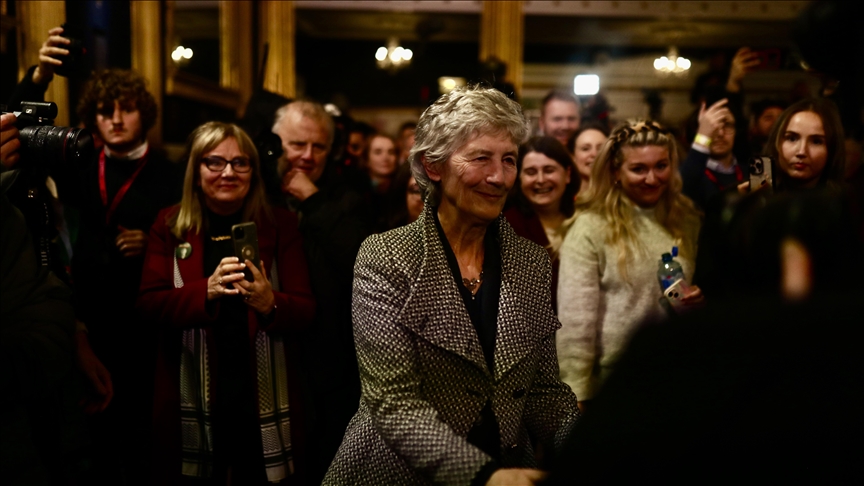Listen to the article
A deepfake video featuring Ireland’s president-elect Peter Burke has triggered renewed concerns about election integrity and the growing threat of artificial intelligence to democratic processes.
The manipulated video, which began circulating on social media platforms shortly after Burke’s victory, showed the newly elected president appearing to make inflammatory statements about immigration policies that contradicted his official campaign positions. The sophisticated nature of the deepfake—with realistic voice mimicry and facial movements—made it difficult for many viewers to identify as fraudulent.
Irish authorities quickly mobilized to address the misinformation. The National Cyber Security Centre issued an alert about the video within hours of its appearance, while platforms including X (formerly Twitter) and Facebook applied warning labels before eventually removing the content from circulation.
“This incident demonstrates the evolving sophistication of AI-generated deepfakes and their potential to disrupt democratic processes,” said Dr. Siobhan Murphy, a digital media researcher at Trinity College Dublin. “What’s particularly concerning is the timing—coming immediately after an election when public attention is high but before the new administration has established clear communication channels.”
The deepfake represents the latest in a growing trend of AI-manipulated content targeting political figures worldwide. Similar incidents have occurred recently in Slovakia, the United Kingdom, and Taiwan, where electoral processes have been disrupted by false videos or audio recordings of candidates making controversial statements.
Burke, who will be formally inaugurated next week, addressed the incident during a press conference yesterday. “While I’m personally disturbed by this attempt to misrepresent my views, I’m more concerned about what this means for our democratic institutions,” he said. “We must develop better safeguards against this type of technological manipulation.”
Ireland’s experience highlights the challenges facing democracies globally as AI technology becomes more accessible and sophisticated. The country’s Electoral Commission has announced plans to establish a special task force focused on preventing similar incidents in future elections, including potential new legislation requiring clearer identification of AI-generated content.
Tech policy experts note that the incident reveals gaps in current regulatory frameworks. “European Digital Services Act provisions are still being implemented, and there’s an urgent need to address AI-specific threats to election integrity,” explained Maria Hernandez, policy director at the European Digital Rights Initiative. “Ireland is now at the forefront of this conversation, but it’s a global challenge requiring international cooperation.”
The incident has also prompted calls from civil society organizations for increased digital literacy programs. “Technology is advancing faster than public awareness,” noted Digital Rights Ireland spokesperson James O’Neill. “We need comprehensive education initiatives to help citizens identify manipulated content, especially during critical democratic moments like elections.”
Ireland’s experience comes amid growing international concern about AI’s role in elections, with major votes scheduled in over 40 countries throughout 2024. The European Union has accelerated discussions about implementing specific AI safeguards before parliamentary elections later this year.
Market analysts observe that the incident may accelerate investment in authentication technologies. “We’re seeing increased interest in blockchain-based verification systems and AI detection tools,” said Sarah Johnson, technology analyst at Dublin-based financial services firm O’Reilly Partners. “Companies developing these solutions are likely to see significant growth as governments and media organizations seek to protect content integrity.”
For now, Irish officials are conducting a forensic investigation to identify the source of the deepfake. Cybersecurity experts note that attribution remains challenging, as such content can be created using widely available tools with minimal technical expertise required.
The incident serves as a sobering reminder of democracy’s vulnerability in the digital age. As Burke prepares to take office, his administration faces not only traditional governance challenges but also the task of protecting Ireland’s information ecosystem against increasingly sophisticated technological threats.
Fact Checker
Verify the accuracy of this article using The Disinformation Commission analysis and real-time sources.




12 Comments
While the technology behind deepfakes is impressive, its malicious use to undermine elections is deeply concerning. Addressing this challenge will require a collaborative effort between policymakers, tech companies, and the public.
This incident shows how quickly disinformation can spread in the digital age. It’s a sobering reminder of the need for robust cybersecurity measures and a well-informed public to protect the integrity of elections.
While the technology behind deepfakes is impressive, it’s disheartening to see it used to undermine democratic processes. Fact-checking and media literacy education will be essential going forward.
This incident highlights the need for robust media literacy programs to help the public navigate the increasingly complex digital landscape. Identifying manipulated content is a crucial skill for citizens in the 21st century.
This is a concerning development that highlights the challenges we face in the digital age. Sophisticated AI can create highly convincing fakes that erode public confidence. Robust safeguards and public education are needed to combat this threat.
I agree. Maintaining the integrity of elections is critical for a healthy democracy. Vigilance and rapid response are key to mitigating the impact of such deepfake disinformation campaigns.
The timing of this deepfake video is particularly problematic, as it could sow doubt and confusion among voters. Maintaining trust in the electoral process is essential for a healthy democracy.
Deepfake videos are a serious threat to election integrity. While the technology is impressive, it can be used to mislead and manipulate voters. Rigorous verification and fact-checking are crucial to maintain trust in the democratic process.
Deepfake videos present a serious challenge to election integrity. Strengthening digital forensics capabilities and promoting transparency around the use of AI-generated content will be crucial to address this threat.
Agreed. Tackling this issue will require a multi-pronged approach involving policymakers, tech companies, and the public. Raising awareness and empowering citizens to identify manipulated media is key.
The sophistication of this deepfake video is worrying. It’s a stark reminder that we must remain vigilant against the spread of misinformation, especially around critical democratic processes like elections.
The timing of this deepfake video is particularly worrying, coming right after the election. It’s crucial that authorities act swiftly to identify the source and limit the spread of this type of manipulative content.